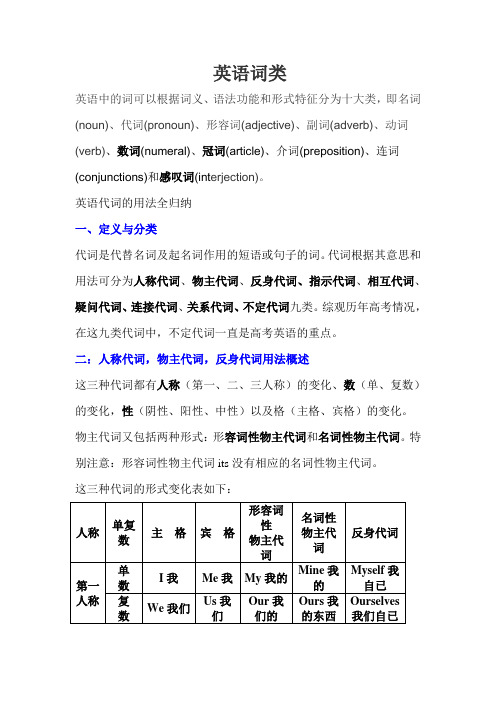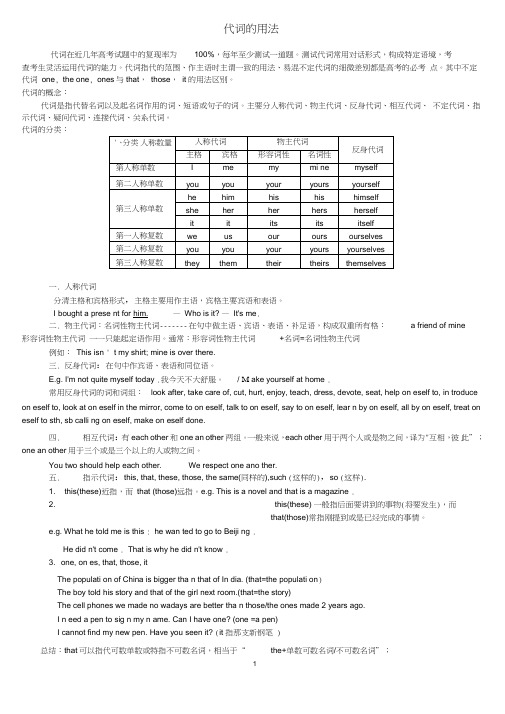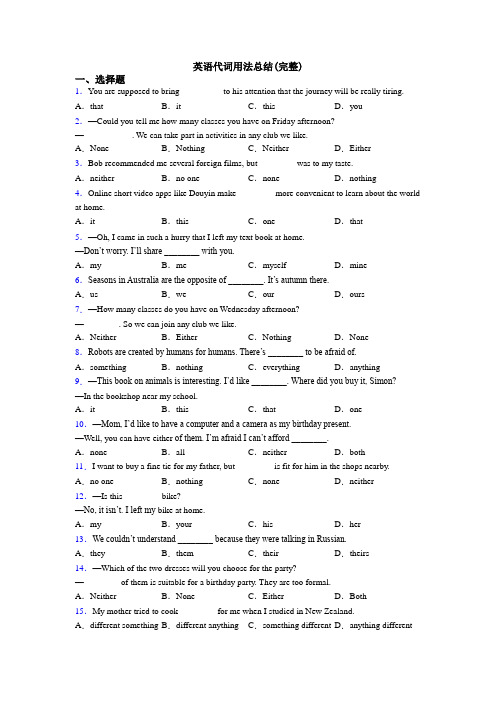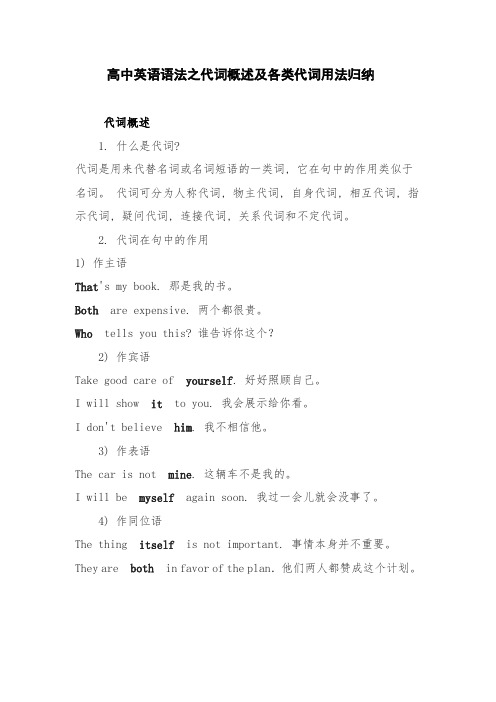(完整版)高中英语代词的用法
(完整版)英语代词的用法全归纳

英语词类英语中的词可以根据词义、语法功能和形式特征分为十大类,即名词(noun)、代词(pronoun)、形容词(adjective)、副词(adverb)、动词(verb)、数词(numeral)、冠词(article)、介词(preposition)、连词(conjunctions)和感叹词(int erjection)。
英语代词的用法全归纳一、定义与分类代词是代替名词及起名词作用的短语或句子的词。
代词根据其意思和用法可分为人称代词、物主代词、反身代词、指示代词、相互代词、疑问代词、连接代词、关系代词、不定代词九类。
综观历年高考情况,在这九类代词中,不定代词一直是高考英语的重点。
二:人称代词,物主代词,反身代词用法概述这三种代词都有人称(第一、二、三人称)的变化、数(单、复数)的变化,性(阴性、阳性、中性)以及格(主格、宾格)的变化。
物主代词又包括两种形式:形容词性物主代词和名词性物主代词。
特别注意:形容词性物主代词its没有相应的名词性物主代词。
这三种代词的形式变化表如下:三、人称代词的用法1) 定义:人称代词是用来指代人、动物或事物的代词。
它必须在人称(第一人称、第二人称、及第三人称)、数(单数、复数)以及性(阴性、阳性、中性)三方面与被指代的名词一致。
如:I am a student. Tom is a boy, and he is a student.Mary is very pretty, and she likes singing.The boys are students, and they are in the room.The doy is small. It is Tom's.2)人称代词的句法功能A) 人称代词有主格和宾语之分:主格用作主语,宾格用作宾语。
B) 人称代词的主格形式在在句中作主语和表语。
如: I like music(主语). She is a teacher.(主语)She and I are good friends(主语).Neither she nor I am student.——I saw the boys this morning.——Are you sure it was they(表语)?C) 人称代词的宾格在句子作动词的宾语,或者介词的宾语。
高中英语代词用法总结

-
26
关系代词型的what
What可引导从句,表示“the thing which…”,例如: e.g. That's what I want to know. 这正是我想知道的事。
-
13
3.名词性物主代词相当于名词,可以在句中单独承担句子成分,其人称、数和性由其所 指代的名词或代词决定。 e.g. This is your coat. Mine is in the room. 这是你的外套,我的外衣在房间里。
My pen is broken. Please lend me yours. 我的钢笔坏了,请把你的借给我。
c. 婴儿 Her new baby is tiny. It only weighs 2 kilos. 她刚生的婴儿个头很小,才两公斤。
-
9
d. 打电话时问对方是谁 Who is it(that)? — It's me. 是谁来电话?—是我
e. 时间、日期等 What time is it? — It is eight o'clock. 现在几点钟?— 八点。
词义
-
12
物主代词
1. 形容词性物主代词相当于形容词,在句中只能做定语,其人称、数和性取决于所指 的名词或代词。如:
Kathy has cut her finger. 凯西把手划破了。 Everybody must do his work well. 人人都应做好自己的工作。
2. 可与own连用表示强调。如: I saw it with my own eyes.那是我亲眼所见。 He has nothing of his own.他自己一无所有。
英语代词的用法总结

英语代词的用法总结代词是一类非常常见的词汇,它用来替代名词或者名词短语,从而避免重复,使语言表达更加简洁、清晰。
英语中的代词种类繁多,常见的包括人称代词、指示代词、不定代词、反身代词、相互代词等。
一、人称代词。
人称代词是用来代替人或事物的一个称呼,包括主格、宾格和所有格。
主格代词作为主语出现,宾格代词作为宾语出现,所有格代词表示所有的关系。
主格:I, you, he, she, it, we, you, they。
宾格:me, you, him, her, it, us, you, them。
所有格:mine, yours, his, hers, its, ours, yours, theirs。
二、指示代词。
指示代词用于指示或代替特定的名词或名词短语,包括近指示代词和远指示代词。
近指示代词:this, these。
远指示代词:that, those。
三、不定代词。
不定代词指的是代表一个或多个人或事物,但不确定具体的人或事物的代词,包括some, any, no, many, few等。
some:表示肯定的数量,可以用作代词或形容词。
any:表示否定或疑问的数量,常用于疑问句和否定句中。
no:表示否定,表示数量为零。
many:表示大量的数量。
few:表示少量的数量。
四、反身代词。
反身代词是指主语动作的改变或接收者与主语是同一个人或物的代词。
常用的反身代词包括myself, yourself, himself, herself, itself, ourselves, yourselves, themselves。
五、相互代词。
相互代词指的是两个或多个人或事物相互影响或互相依赖的代词,包括each other和one another。
each other用于表示两个人或事物之间的相互关系,one another则用于表示三个或以上人或事物之间的相互关系。
综上所述,代词在英语中扮演着非常重要的角色,它不仅使语言表达更加简洁、清晰,还可以避免重复,如果你掌握了各种代词的用法,那么你的英语将会变得更加流利。
英语代词的用法全归纳

英语词类英语中的词可以根据词义、语法功能和形式特征分为十大类,即名词(noun)、代词(pronoun)、形容词(adjective)、副词(adverb)、动词(verb)、数词(numeral)、冠词(article)、介词(preposition)、连词(conjunctions)和感叹词(int erjection)。
英语代词的用法全归纳一、定义与分类代词是代替名词及起名词作用的短语或句子的词。
代词根据其意思和用法可分为人称代词、物主代词、反身代词、指示代词、相互代词、疑问代词、连接代词、关系代词、不定代词九类。
综观历年高考情况,在这九类代词中,不定代词一直是高考英语的重点。
二:人称代词,物主代词,反身代词用法概述这三种代词都有人称(第一、二、三人称)的变化、数(单、复数)的变化,性(阴性、阳性、中性)以及格(主格、宾格)的变化。
物主代词又包括两种形式:形容词性物主代词和名词性物主代词。
特别注意:形容词性物主代词its没有相应的名词性物主代词。
这三种代词的形式变化表如下:18三、人称代词的用法:人称代词是用来指代人、动物或事物的代词。
它必须在人1) 定义(阴以及性数、(单数、复数)称(第一人称、第二人称、及第三人称) 性、阳性、中性)三方面与被指代的名词一致。
Tom is a boy, and he is a student. I am a student. 如:Mary is very pretty, and she likes singing.The boys are students, and they are in the room.The doy is small. It is Tom's.人称代词的句法功能2) A) 人称代词有主格和宾语之分:主格用作主语,宾格用作宾语。
B) 人称代词的主格形式在在句中作主语和表语。
)主语She is a teacher.( 主语如: I like music().18/ 2She and I are good friends(主语).Neither she nor I am student.——I saw the boys this morning.——Are you sure it was they(表语)?C) 人称代词的宾格在句子作动词的宾语,或者介词的宾语。
高中英语语法总结大全之代词

高中英语语法总结大全之代词人称代词的用法1)人称代词的主格在句子中作主语或主语补语,例如:John waited a while but eventually he went home.约翰等了一会儿,最后他回家了。
John hoped the passenger would be Mary and indeed it was she.约翰希望那位乘客是玛丽,还真是她。
说明:在复合句中,如果主句和从句主语相同,代词主语要用在从句中,名词主语用在主句中,例如:When he arrived, John went straight to the bank.约翰一到就直接去银行了。
2)人称代词的宾格在句子中作宾语或介词宾语,但在口语中也能作主语补语,第一人称在省略句中,还可以作主语,例如:I saw her with them, at least, I thought it was her.我看到她和他们在一起,至少我认为是她。
(her做宾语,them做介词宾语,her作主语补语)a. -- Who broke the vase?--谁打碎了花瓶?b. -- Me.--我。
(me作主语补语= It's me.)说明:在上面两例句中,her和me分别作主语补语。
现代英语中多用宾格,在正式文体中这里应为she和I。
人称代词之主、宾格的替换1) 宾格代替主格a.在简短对话中,当人称代词单独使用或在not 后,多用宾语。
---- I like English.--我喜欢英语。
---- Me too.--我也喜欢。
---- Have more wine?--再来点酒喝吗?---- Not me.--我可不要了。
b.在表示比较的非正式的文体中,常用宾格代替主格。
但如果比较状语的谓语保留,则主语只能用主格。
He is taller than I/me.He is taller than I am.2) 主格代替宾格a. 在介词but,except 后,有时可用主格代替宾格。
(完整word)(完整word版)高考英语代词用法

代词的用法代词在近几年高考试题中的复现率为100%,每年至少测试一道题。
测试代词常用对话形式,构成特定语境,考查考生灵活运用代词的能力。
代词指代的范围、作主语时主谓一致的用法、易混不定代词的细微差别都是高考的必考点。
其中不定代词one, the one, ones与that,those,it的用法区别。
代词的概念:代词是指代替名词以及起名词作用的词、短语或句子的词。
主要分人称代词、物主代词、反身代词、相互代词、不定代词、指示代词、疑问代词、连接代词、关系代词。
代词的分类:一.人称代词分清主格和宾格形式,主格主要用作主语,宾格主要宾语和表语。
I bought a prese nt for him. —Who is it? —It's me.二.物主代词:名词性物主代词------- 在句中做主语、宾语、表语、补足语,构成双重所有格: a friend of mine形容词性物主代词一一只能起定语作用。
通常:形容词性物主代词+名词=名词性物主代词例如:This isn ' t my shirt; mine is over there.三.反身代词:在句中作宾语、表语和同位语。
E.g. I'm not quite myself today .我今天不大舒服。
/ M ake yourself at home .常用反身代词的词和词组:look after, take care of, cut, hurt, enjoy, teach, dress, devote, seat, help on eself to, in troduceon eself to, look at on eself in the mirror, come to on eself, talk to on eself, say to on eself, lear n by on eself, all by on eself, treat on eself to sth, sb calli ng on eself, make on eself done.四.相互代词:有each other和one an other两组。
英语代词用法总结(完整)

英语代词用法总结(完整)一、选择题1.You are supposed to bring _________ to his attention that the journey will be really tiring. A.that B.it C.this D.you2.—Could you tell me how many classes you have on Friday afternoon?—___________. We can take part in activities in any club we like.A.None B.Nothing C.Neither D.Either3.Bob recommended me several foreign films, but ________ was to my taste.A.neither B.no one C.none D.nothing 4.Online short video apps like Douyin make ________ more convenient to learn about the world at home.A.it B.this C.one D.that5.—Oh, I came in such a hurry that I left my text book at home.—Don’t worry. I’ll share ________ with you.A.my B.me C.myself D.mine 6.Seasons in Australia are the opposite of ________. It’s autumn there.A.us B.we C.our D.ours7.—How many classes do you have on Wednesday afternoon?—________. So we can join any club we like.A.Neither B.Either C.Nothing D.None8.Robots are created by humans for humans. There’s ________ to be afraid of. A.something B.nothing C.everything D.anything 9.—This book on animals is interesting. I’d like ________. Where did you buy it, Simon?—In the bookshop near my school.A.it B.this C.that D.one 10.—Mom, I’d like to have a computer and a camera as my birthday present.—Well, you can have either of them. I’m afraid I can’t afford ________.A.none B.all C.neither D.both11.I want to buy a fine tie for my father, but ________ is fit for him in the shops nearby.A.no one B.nothing C.none D.neither12.—Is this ________ bike?—No, it isn’t. I left my bike at home.A.my B.your C.his D.her13.We couldn’t understand ________ because they were talking in Russian.A.they B.them C.their D.theirs 14.—Which of the two dresses will you choose for the party?—________ of them is suitable for a birthday party. They are too formal.A.Neither B.None C.Either D.Both15.My mother tried to cook ________ for me when I studied in New Zealand.A.different something B.different anything C.something different D.anything different16.I can take good care of myself. I do not depend on ________.A.anybody B.everybody C.nothing D.something 17.The young should learn how to look after ________ and be more independent.A.they B.them C.their D.themselves 18.Miss Liu is kind enough to help us whenever she is needed. We all like ______.A.she B.her C.him D.them19.New Zealand has two islands. One is North Island and is South Island.A.another B.the other C.other D.the others 20.—Jack, you left your coat in the playground again?—It isn’t ________. Look, my coat is in my bag.A.mine B.my C.your D.yours 21.Some friends tried to calm down Mr. and Mrs. White and help solve their problem without hurting the feeling of ________, but failed.A.both B.none C.either D.neither 22.—Excuse me, Linda, but which is for me?—You can take ________ half. They are exactly the same.A.any B.either C.neither D.both23.— The TV series Love Designer is the most romantic drama I have ever seen.—I’m afraid it’s not ________ cup of tea.A.anybody’s B.everybody’s C.somebody’s D.nobody’s 24.Wu Xinhai, a stay-at-home dad, said “I want my kids to have a different childhood from________.”A.me B.mine C.myself D.I25.— Who was calling you on the phone just now?— ________ was my mum.A.She B.That C.It D.This26.We all think ________ comfortable to live in Yancheng. It’s a beautiful and modern city. A.this B.that C.it D.what 27.—Mary, is this ________ blue bike?—No, ________ is a black one.A.your; my B.your; mine C.yours; my D.yours; mine 28.The teacher shared the photos of our school trip on her WeChat Moments. We can see them for ________.A.herself B.himself C.ourselves D.themselves 29.— Lucy, do you know whose wallet it is on the table?—Sorry, I don’t know. I asked many people, but ________ knew.A.nobody B.everybody C.anybody D.somebody 30.—Though the film Hi, mom has achieved a great success, it isn’t liked by ________.—I think so. It is hard to please all.A.nobody B.somebody C.everybody D.anybody31.Think twice and make the decision. _______ else can do it for you.A.Somebody B.Nobody C.Everybody D.Anybody 32.—Tickets for Friday.—Sorry, we’ve got ________ left.A.none B.nothing C.no D.no one33.If something is wrong, fix it. Do not worry. Worry never fixes ________.A.something B.anything C.nothing D.everything 34.—He was the strong silent type.—Yes. He thought ________ better to say nothing.A.it B.its C.it’s D.itself 35.—Few films have had a greater effect on popular culture than Steven Spielberg’s.—It’s just your cup of tea. To me, his works are ________ more than entertainment. A.something B.anything C.nothing D.everything 36.We found ________ easy to finish the task by working as a team.A.it’s B.that C.this D.it37.—Are there any air tickets to Hong Kong?—Sorry. There is ________ left.A.nothing B.none C.nobody D.no one38.It is wrong to copy others’ answers. Do homework by ________, boys!A.yourself B.yourselves C.myself D.ourselves 39.—Have you prepared ________ for the picnic tomorrow?—-No, except the drinks.A.nothing B.anything C.everything D.something 40.As the old saying goes, politeness costs nothing and gains ________.A.nothing B.anything C.everything D.something【参考答案】一、选择题1.B解析:B【详解】句意:你应该让他注意到这次旅行会很累。
高中英语语法之代词概述及各类代词用法讲义

高中英语语法之代词概述及各类代词用法归纳代词概述1. 什么是代词?代词是用来代替名词或名词短语的一类词, 它在句中的作用类似于名词。
代词可分为人称代词, 物主代词, 自身代词, 相互代词, 指示代词, 疑问代词, 连接代词, 关系代词和不定代词。
2. 代词在句中的作用1) 作主语That's my book. 那是我的书。
Both are expensive. 两个都很贵。
Who tells you this? 谁告诉你这个?2) 作宾语Take good care of yourself. 好好照顾自己。
I will show it to you. 我会展示给你看。
I don't believe him. 我不相信他。
3) 作表语The car is not mine. 这辆车不是我的。
I will be myself again soon. 我过一会儿就会没事了。
4) 作同位语The thing itself is not important. 事情本身并不重要。
They are both in favor of the plan.他们两人都赞成这个计划。
5) 作呼语You stand here and wait for the bus. 你站在这儿等公车吧。
Be patient, everyone. 大家都耐心点吧。
6) 作定语That's my glasses. 那是我的眼镜。
I'll buy that umbrella.人称代词1. 人称代词的词汇a) 人称代词主格 (在句中作主语)单数第一人称: I (我)单数第二人称: you (你)单数第三人称: he, she, it (他,她,它)复数第一人称: we(我们)复数第二人称: you(你们)复数第三人称: they (他们/她们/它们)b) 人称代词宾格 (在句中作宾语)单数第一人称: me (我)单数第二人称: you (你)单数第三人称: him, her, it(他,她,它)复数第一人称: us(我们)复数第二人称: you(你们)复数第三人称: them (他们/她们/它们)2. 人称代词在句中的作用1) 作主语I am a student. 我是一名学生。
英语语法:代词的用法

英语语法:代词的用法代词是代替名词的词类。
大多数代词具有名词和形容词的功能。
英语中的代词,按其意义、特征及在句中的作用分为:人称代词、物主代词、指示代词、自身代词、相互代词、疑问代词、关系代词和不定代词八种。
下面就来跟着小编一起学习英语语法:代词的用法吧。
英语语法:代词的用法一、人称代词是表示"我"、"你"、"他"、"她"、"它"、"我们"、"你们"、"他们"的词。
人称代词有人称、数和格的变化,见下表:数单数复数格主格宾格主格宾格第一人称I me we us第二人称you you you you第三人称he him they them she her they them it it they them例如:Heis my friend. 他是我的朋友。
It's me. 是我。
二、物主代词是表示所有关系的代词,也可叫做代词所有格。
物主代词分形容性物主代词和名词性物主代词两种,其人物和数的变化见下表。
数单数复数人称第一人称第二人称第三人称第一人称第二人称第三人称形容词性物主代词my your his/her/its our your their名词性物主代词mine yourshis/hers/its ours yours theirs 例如:I like his car. 我喜欢他的小汽车。
Our school is here,and theirs is there. 我们的学校在这儿,他们的在那儿。
三、指示代词表示"那个"、"这个"、"这些"、"那些"等指示概念的代词。
指示代词有this,that,these,those等。
例如:That is a good idea. 那是个好主意。
代词的用法与指代

代词的用法与指代代词是一类用来替代名词或名词词组的词语,它可以在句子中充当名词的角色,起到代替名词的作用。
正确使用代词可以使句子更加简洁明了,增强表达效果。
本文将介绍代词的用法和指代规则。
一、代词的分类代词可分为人称代词、指示代词、疑问代词、不定代词、反身代词等几大类。
1. 人称代词人称代词分为主格和宾格。
主格用于代替句子的主语,宾格用于代替句子的宾语。
例如:主格:我、你、他、她、它、我们、你们、他们宾格:我、你、他、她、它、我们、你们、他们2. 指示代词指示代词用于指示某一个人或事物的位置、方向或距离。
常见的指示代词有:这、那、这些、那些等。
3. 疑问代词疑问代词用于提问,表示不确定的人或事物。
常见的疑问代词有:谁、什么、哪个、几个等。
4. 不定代词不定代词用于泛指某一类人或事物,不具体指向某个人或物。
常见的不定代词有:所有、一些、任何、其他等。
5. 反身代词反身代词用于表示动作的主体同时也是动作的承受者,与动词的主语是同一个人或物。
常见的反身代词有:自己、你自己、他自己等。
二、代词的指代规则在使用代词时,需要遵守一定的指代规则,以确保代词与其所指代的名词或名词词组在性、数、格上保持一致。
1. 代词的数与其所指代的名词一致例如:单数代词指代单数名词:He is a teacher. (他是一个教师)复数代词指代复数名词:They are students. (他们是学生)2. 代词的格与其在句中所担任的角色一致例如:主格代词用于代替主语:I am reading a book. It is interesting. (我正在读一本书,它很有趣)宾格代词用于代替宾语:Mary saw me. She greeted me. (玛丽看见了我,她向我问好)3. 代词的指代清晰明了代词应与其先行词在上下文中的指代关系清晰明了,以避免造成歧义或误解。
三、代词的注意事项1. 不要滥用代词在文中使用代词时,要注意适度,避免频繁使用大量的代词,以免造成困惑或语句不通。
高中英语语法——代词的用法

来代替“形容词性物主代词+名词”的形式。 如:My bag is yellow, her bag is red, his bag is blue
2) 名词性物主代词的句法功能 a. 作主语 如: May I use your pen? Yours works better. b. 作宾语 如:I love my motherland as much as you love
yours. 我爱我的祖国就像你爱你的祖国一样深。 c. 作介词宾语
His cap 意为 The cap is his.
D) 可以说 a friend of mine (ours, yours, hers, his, theirs),=one of my friends;但是不能说 a friend of me (us, you, her, him, them)。
这三种代词都有人称(一、二、三人称) 的变化、数(单、复数)的变化,以及性 (阴性、阳性、中性)的变化。其中,人 称代词除了这三种变化外,还有格(主格、 宾格)的变化。
物主代词又包括两种形式:形容词性物主 代词和名词性物主代词。
特别注意:形容词性物主代词its没有相应 的名词性物主代词。
这三种代词的形式变化表如下
人称 单复数 主 格
宾格
形容词性 名词性 物主代词 物主代词
反身代词
第一 单 数
I
me
人称 复 数
we
us
第二 单 数
高考英语知识点解析代词的指代关系与用法

高考英语知识点解析代词的指代关系与用法高考英语知识点解析:代词的指代关系与用法在高考英语中,代词是一个重要的语法知识点,掌握代词的指代关系与用法对于理解和表达英语句子至关重要。
代词是用来代替名词或名词短语的词,它们可以使语言更加简洁、避免重复。
下面我们就来详细探讨一下高考中常见的代词及其指代关系与用法。
一、人称代词人称代词是表示“我”“你”“他/她/它”“我们”“你们”“他们/她们/它们”的词。
1、主格人称代词:I, you, he, she, it, we, you, they主格人称代词在句子中作主语,例如:“I am a student”(我是一名学生。
)“They are playing football”(他们正在踢足球。
)2、宾格人称代词:me, you, him, her, it, us, you, them宾格人称代词在句子中作宾语,位于动词或介词之后,例如:“She loves me”(她爱我。
)“Give it to him”(把它给他。
)需要注意的是,人称代词的主格和宾格在句子中的位置和用法是不同的,不能混淆。
二、物主代词物主代词表示所属关系,分为形容词性物主代词和名词性物主代词。
1、形容词性物主代词:my, your, his, her, its, our, your, their形容词性物主代词具有形容词的性质,其后必须跟名词,例如:“This is my book”(这是我的书。
)“Their classroom is big”(他们的教室很大。
)2、名词性物主代词:mine, yours, his, hers, its, ours, yours, theirs名词性物主代词具有名词的性质,后面不能跟名词,相当于“形容词性物主代词+名词”,例如:“This book is mine”(这本书是我的。
)“The pen is hers”(这支笔是她的。
)在使用物主代词时,要根据句子的语境和表达的需要选择合适的形式。
高中英语代词的用法有哪些

高中英语代词的用法有哪些代词是代替名词的词,分为人称代词、物主代词、指示代词、反身代词、相互代词、疑问代词、不定代词和关系代词等。
1 常见考法 1.人称代词的宾格在简略答语中的使用。
2.形容词性物主代词和名词性物主代词的用法。
3.it,one,that,ones,those 作为替代词的用法区别。
4.it 表天气、时间、距离等句型及it 作形式主语、形式宾语。
5.反身代词和疑问代词。
1 代词的分类代词是代替名词或一句话的一种词类。
大多数代词具有名词和形容词的功能。
英语中的代词,按其意义、特征及在句中的作用分为:人称代词、物主代词、指示代词、反身代词、相互代词、疑问代词、关系代词、连接代词和不定代词九种。
人称代词主格:I 我you 你he 他she 她they 他们we 我们宾格:me 我you 你him 他her 她them 他们us 我们物主代词my 我的his 他的your 你的(your 你们的)their 他们的her 她的指示代词this 这that 那these 这些those 那些反身代词myself 我自己himself 他自己themselves 他们自己疑问代词who 谁what 什幺which 哪个不定代词some 一些many 许多both 两个;两个都关系代词which……的物who……的人that……的人或物who 谁that 引导定语从句相互代词eachother 互相oneanother 互相连接代词who,whom,whose,what,which,whatever,whichever,whoever,whomever 替代词one(单数),ones(复数)用于替代前面出现的同类事物1 人称代词1)人称代词的人称、数和格,如下表所示。
2)人称代词有主格和宾格之分。
通常主格作主语,宾格作宾语。
如:Iliketable tennis.(作主语) Doyouknowhim?(作宾语)3)人称代词还可作表语。
高中英语知识点归纳代词的人称格和指示用法

高中英语知识点归纳代词的人称格和指示用法代词是英语中的重要词类之一,用于替代名词,可以简化句子结构,使语言更加流畅。
代词的人称格和指示用法对于正确理解和运用代词至关重要。
接下来,将详细归纳高中英语中的代词的人称格和指示用法。
一、人称格代词人称格代词是用于代替特定人或物的代词。
英语中的人称格代词有第一人称、第二人称和第三人称,分别代表了说话人、被说话人和其他人或物的角色。
1. 第一人称代词第一人称代词用于代替说话人,包括主格、宾格和所有格,分别表示主语、宾语和所有者。
主格:I(我)例句:I am a student.(我是一个学生。
)宾格:me(我)例句:Can you help me?(你能帮助我吗?)所有格:my(我的)例句:This is my book.(这是我的书。
)2. 第二人称代词第二人称代词用于代替被说话人,同样包括主格、宾格和所有格。
主格:you(你)例句:You are my best friend.(你是我最好的朋友。
)宾格:you(你)例句:I saw you at the party.(我在派对上见到了你。
)所有格:your(你的)例句:Is this your car?(这是你的车吗?)3. 第三人称代词第三人称代词用于代替除说话人和被说话人之外的其他人或物。
同样包括主格、宾格和所有格。
主格:he(他), she(她), it(它)例句:He is a doctor.(他是一名医生。
)例句:She loves reading.(她喜欢阅读。
)例句:It is raining outside.(外面正在下雨。
)宾格:him(他), her(她), it(它)例句:I saw him at the park.(我在公园见到了他。
)例句:She saw her in the library.(她在图书馆看到了她。
)例句:I found it under the table.(我在桌子下找到了它。
(完整版)高中英语代词用法

• 4) 人称代词在than之 后与其他人或事物进 行比较时,用主格和 宾格都可以。
• He is older than me. • He is older than I.
• 2. 物主代词 • 1)表示所有关系的代词叫物主代词。 • 物主代词分形容词性和名词性物主代词
• 2) 形容词性物主代词的作用相当于形容词, 可在句中作定语。
(1)--- When shall we meet again? --- Make it _a_n_y__ day you like; it’s all the same to me.
(2) --- Can you come on Monday or Tuesday? --- I’m afraid _n_e_i_th__er_ day is possible.
返回目录
(8)few, little a few, a little
(4)another, other, the other, others, the others
another 用于泛指三者以上中的“另一个” other 作前置定语, 修饰单数或复数名词 the other 两者中的“另一个”, 是特指 others 泛指“其他人”或“其他物=”other + 名复 the others 指整体中除去一部分后, 剩余的全部
--- ___N_o__o_n_e__.
(3) --- What are you doing now?
--- ___N_o_t_h_i_n_g_.
(4) Cities have theaters, museums and big sporting
events, but small towns have __n__o_n_e_.
高中英语代词的用法详解

高中英语代词的用法详解推荐文章高中英语情态动词用法及解题技巧分析热度:高中英语数词的基本用法热度:高中英语倒装句常见的结构和用法分析热度:高中英语at、in与on的用法区别介绍热度:高中英语like与as的用法区别介绍热度:代词是代替名词的词,在高中英语的应用是比较广泛的,下面店铺的小编将为大家带来高中英语代词的用法的介绍,希望能够帮助到大家。
高中英语代词的用法介绍1常见考法1.人称代词的宾格在简略答语中的使用。
2.形容词性物主代词和名词性物主代词的用法。
3.it, one, that, ones, those作为替代词的用法区别。
4.it表天气、时间、距离等句型及it作形式主语、形式宾语。
5.反身代词和疑问代词。
2代词的分类代词是代替名词或一句话的一种词类。
大多数代词具有名词和形容词的功能。
英语中的代词,按其意义、特征及在句中的作用分为:人称代词、物主代词、指示代词、反身代词、相互代词、疑问代词、关系代词、连接代词和不定代词九种。
人称代词主格:I我 you你 he他 she她 they他们 we我们宾格:me我 you你 him他 her她 them他们 us我们物主代词 my我的 his他的 your你的(your你们的) their他们的her她的指示代词 this这 that那 these这些 those 那些反身代词myself我自己 himself他自己 themselves他们自己疑问代词who谁 what什么 which哪个不定代词some一些 many许多 both两个;两个都关系代词which……的物who……的人that……的人或物who谁that引导定语从句相互代词 each other 互相 one another互相连接代词who,whom,whose,what,which,whatever,whichever,whoever,who mever替代词one(单数),ones(复数) 用于替代前面出现的同类事物3人称代词1)人称代词的人称、数和格,如下表所示。
- 1、下载文档前请自行甄别文档内容的完整性,平台不提供额外的编辑、内容补充、找答案等附加服务。
- 2、"仅部分预览"的文档,不可在线预览部分如存在完整性等问题,可反馈申请退款(可完整预览的文档不适用该条件!)。
- 3、如文档侵犯您的权益,请联系客服反馈,我们会尽快为您处理(人工客服工作时间:9:00-18:30)。
代词一、定义与分类代词是代替名词及起名词作用的短语或句子的词。
代词根据其意思和用法可分为人称代词、物主代词、反身代词、指示代词、相互代词、疑问代词、连接代词、关系代词、不定代词九类。
综观历年高考情况,在这九类代词中,不定代词一直是高考英语的重点。
⏹人称代词I , you ,she ,him⏹疑问代词who, whom, whose, which, what (用于引出特殊疑问句的代词)注意:what与which的用法区别:当选择的范围较明确时,用which;不明确时用what。
如:Which color do you like, red, black or white? What color is your car?⏹物主代词my 、your、hers⏹关系代词which 、that、who、whom⏹反身代词myself、yourselves注意:反身代词用于be, feel, seem, look 等后作表语表示身体或精神所处的状态。
如:I'll be myself again in no time. 我一会儿就会好的。
He doesn't feel himself today.I’m not quite myself these days. 我近来身体不大舒服。
⏹连接代词who, whom, what, which, whose, whoever, whatever, whichever主要用于引导主语从句、宾语从句和表语从句等⏹相互代词each other、one another⏹不定代词one、each、another、neither⏹指示代词this、that、those、these注意:a. 为避免重复,可用that 和those 代替前面提到的名词。
如:The playground of this school is bigger than that of that school.(that=the playground)My books are next to those of the monitor.b. 在打电话时,通常用this 指自己,用that指对方:如:Hello. This is Jim. Is that John?c. this 和that 还可用作副词,用以修饰形容词或副词,意为“这么”、“那么”,相当于so。
如:I've done only that much. 我所做的就这么多。
Is he always this busy? 他总这么忙吗?二:人称代词,物主代词,反身代词用法概述这三种代词都有人称(一、二、三人称)的变化、数(单、复数)的变化,以及性(阴性、阳性、中性)的变化。
其中,人称代词除了这三种变化外,还有格(主格、宾格)的变化。
物主代词又包括两种形式:形容词性物主代词和名词性物主代词。
特别注意:形容词性物主代词its没有相应的名词性物主代词。
这三种代词的形式变化表如下:三、不定代词的用法1)定义:不定代词是不指明代替任何特定名词或形容词的代词。
2)分类:英语中不定代词有:some(something,somebody,someone,somewhere),any(anything,anybody,anyone,anywhere),no(nothing,nobody,no one),every(everything,everybody,everyone,everywhere),all,each,both,much,many,(a)little,(a)few,other(s),another,none,one,either,neither等。
2)不定代词的句法功能1)作主语,例:Both(of us)are right.Neither(of the answers)is correct.2)作宾语,例:There is room for all of us.If you have any,give us some.3)作表语,例:Is that all you want to know?I’m not somebody,I’m nobody.我不是重要人物,我是个无名小卒.4)作定语,例:You may take either road.Everybody‘s business is nobody’s business.人人都管等于没人管。
(谚)5)作同位语,例:They both agreed to stay here.We none of us said anything.☆不定代词是英语所有代词中最重要的一类,也是高考英语中最常考的一类,复习时应注意以下几点:1. some和any的比较不定代词some,any都是“一些”的意思,都可和可数名词或不可数名词连用。
some一般用于肯定句中;而any 则用于否定句、疑问句或条件从句中.例:Tom has some picture-books.I have waited some time.Have you any questions?There aren’t any pictures on the wall.注意:在表示请求、邀请或征求意见的句子中,通常要用some 而不用any。
如:Will you lend me some money? Why don’t you bring some flowers?2. 指两者和三者的不定代词。
有些不定代词用于指两者(如both, either, neither),有的不定代词用于指三者(如all, any, none, every),具体使用时要根据一定的上下文正确选用。
如:He is blind in both eyes. 他双目失明。
Were they all college students? 他们都是大学生吗?注意:each 可用于两者、三者或三者以上,而every 只用于三者或三者以上,因此用于两者时只能用each,不能用every。
如:There are trees on each side of the road.3. (a) few 与(a) little。
few和a few 后接复数名词,而little和a little后接不可数名词。
其中few 和little表示数量很少或几乎没有,强调“少”,含有否定意义;而a few 和 a little 则表示数量虽然少但毕竟还有,强调“有”,含有肯定意义。
如:He knew few of them. He sold only a few of the papers. 他只卖出了几份报纸。
He knew little about it. There is still a little left.4. all, every, each的用法。
从强调重点上看:all强调整体,every 强调总体中的所有成员(与all很接近),each则强调逐个逐个地;从用法上看:all和each既可单独使用,也可后接名词,还可后接of短语;而every 后必须接名词,既不能单独使用也不能后接of 短语;从含义上看,each 指两者或两者以上的“每个”,every指三者或三者以上“每个”,因此指两者时只能用each。
如:All was destroyed in the big fire.Each of us has a book.All are present.= Everyone is present..注意:1)在表示“每个”、“全体”意思时,every的意思与all很接近。
但一般情况下every和单数名词搭配,all 和复数名词搭配。
例:Every child enjoys Christmas.All children enjoy Christmas.2)each也是“每一个”的意思,但与every不同,each用于指两个或两个以上的人或物,着重于个别概念。
例:Two men came into the room.Each carried an umbrella.Each/Every book on this desk is worth reading.5.other, the other, another, others的用法。
指单数时,若泛指用another,若特指用the other;指复数时,若泛指用other(后接复数名词)或others(其后不接名词),若特指用the other (后接复数名词)或the others(其后不接名词)。
如:Show me some others. Show me another.We should think of others. Where are the other students?注:another后一般要单数可数名词,若其后的名词有数词或few 修饰,则也可接复数名词。
如:I've got another five minutes. 我还有5分钟。
6.no one, nobody, none 的用法。
no one 与nobody 用法相似,均只用于指人不用于指物,且其后不能接of短语,用作主语时谓语用单数;而none 既可用于指人也可用于指物,其后通常接of短语,用作主语时,若指不可数名词,谓语只能用单数,若指复数名词,则谓语可用单数(较正式)也可用复数(用于非正式文体)。
如:No one [Nobody] has read it. None of this milk can be used.None of the films is [are] worth seeing.7. 复合不定代词的用法。
复合不定代词主要包括something, somebody, someone, anything, anybody, anyone, nothing, nobody, no one, everything, everybody, everyone 等,它们在句中可用作主语、宾语或表语,但不能用作定语。
其中something, someone 等和anything, anyone等的区别与some 和any 的区别一样,前者一般用于肯定句,后者一般用于否定句、疑问句或条件句。
使用时应请注意以下几点:(1) 受定语修饰时,定语应置于其后。
如:Tell us something interesting. There was nobody tired.(2) 指人的复合不定代词若用作主语,其谓语动词一般用单数,相应的人称代词和物主代词也用单数he, him, his (不一定指男性)。
